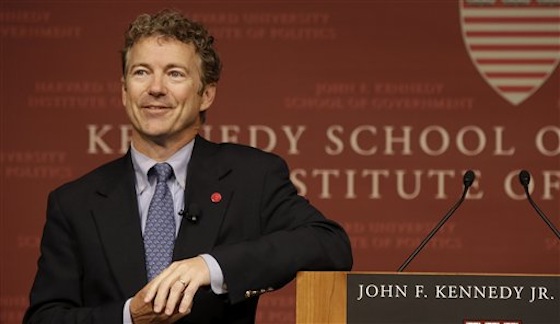Sign up for the daily CJR newsletter.
On Monday, The Washington Post analyzed the evolution of some of Sen. Rand Paul’s policy positions — flip-flops — in a frontpage story. Among the examples given was his recent support for military action against the Islamic State in Iraq and Syria, an about-face from his stance in June. The collective takeaway on the libertarian-leaning Paul, David Fahrenthold reports, is that the senator’s oft-divergent public statements show “that he did not come to Washington to be a purist like his father, former congressman Ron Paul (R-Tex.). He came to be a politician, like everybody else.”
Rising star Rand Paul, seen by many as a leading candidate for the 2016 GOP presidential nomination, speaks at Harvard University in April 2014 (AP Photo/Stephan Savola)
While the political press has all but coronated Hillary Clinton as the 2016 Democratic presidential nominee, the potential GOP standard-bearer remains anyone’s guess. But few would-be candidates have attracted as much media attention as the junior senator from Kentucky. The first-term lawmaker fashions himself as a new sort of Republican, with a foot in both the libertarian and mainstream conservative worlds. Paul’s hazy ideology is especially evident in debates on foreign policy, to which a large portion of Monday’s story was dedicated.
The Paul camp was unhappy with the piece. And in an interview published Wednesday by The Federalist, a conservative online magazine, the senator shot back:
“The hit piece in the Washington Post was just so full of inaccuracies, I think there was no quote from us in the whole piece – an enormous piece, a hit job on me, and they never quoted us for a response on anything. My position hasn’t changed on foreign aid to Israel, my position has not changed on Medicare. Everything they’d said that my position had changed on, I think, frankly, is untrue.”
Such criticism is nothing new. Elected officials often blast unflattering coverage through interviews with other, typically friendlier, outlets. Paul, however, not only took issue with the story’s conclusions, but also questioned its reporting process. The Post didn’t let that go unchallenged. Later that day, Fahrenthold penned a new piece with a straightforward headline: “Rand Paul says Post story is ‘full of inaccuracies.’ He won’t say what they are.”
The short story provides a clear window into the one that preceded it, which required “an examination of Paul’s speeches, op-eds and 326 pieces of legislation he has submitted as a senator.” Fahrenthold disproves the senator’s accusation of there being “no quote from [my staff] in the whole piece,” listing interviews with four Paul advisers and aides. He goes on to describe the Post’s more than week-long effort to speak with Paul himself, including an email from a spokesman saying it wouldn’t be possible. What’s more, Fahrenthold responds to Paul’s most serious accusation in the interview:
“Afterward, The Post asked a spokesman for Paul’s Senate office to identify the inaccuracies that the senator had been referring to.
Paul’s spokesman declined. ‘We will be doing this on another platform,’ spokesman Brian Darling wrote in an e-mail.”
Darling’s remark comes off as petty, at best. And it helps show how politicians and their staffers often dance around simple questions. CJR has previously analyzed how the Washington press corps battles increasingly sophisticated political PR machines while covering the federal government. Some commenters, such as National Journal’s Ron Fournier, argue that reporters should begin playing hardball in response. “Play fair,” Fournier writes. “Be transparent and honest. But covering masters of the universe isn’t, as they say, beanbag.”
That’s just how the Post pushed back on Paul’s criticism, an effort of which the political press should take note. The newspaper deserves a LAUREL for playing hardball.
Has America ever needed a media defender more than now? Help us by joining CJR today.







